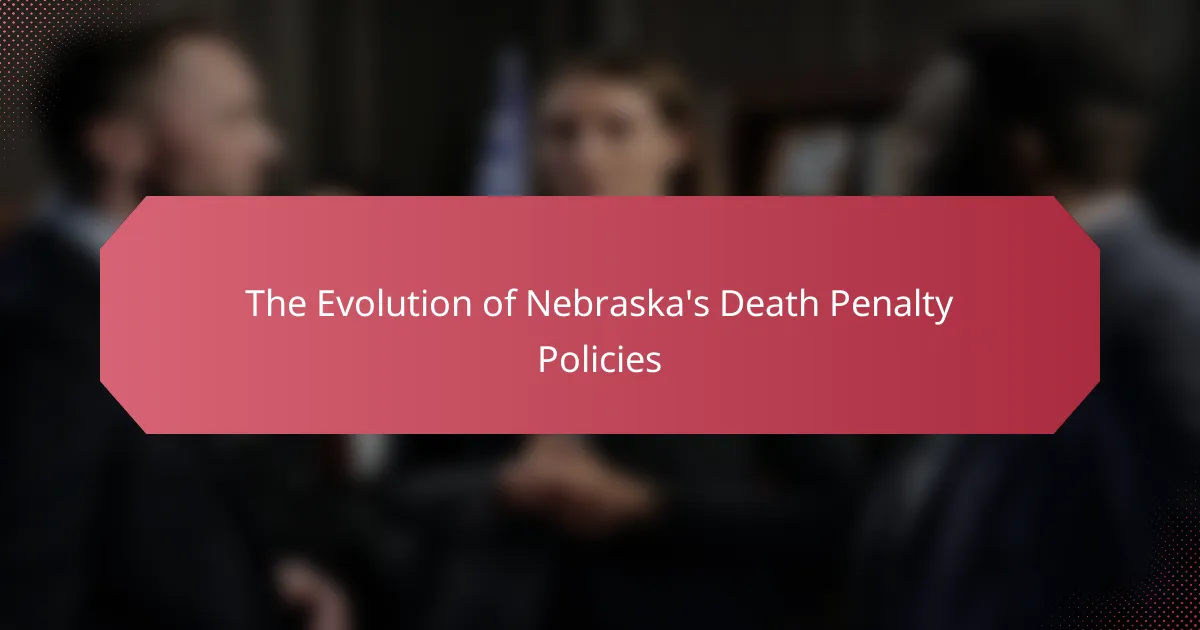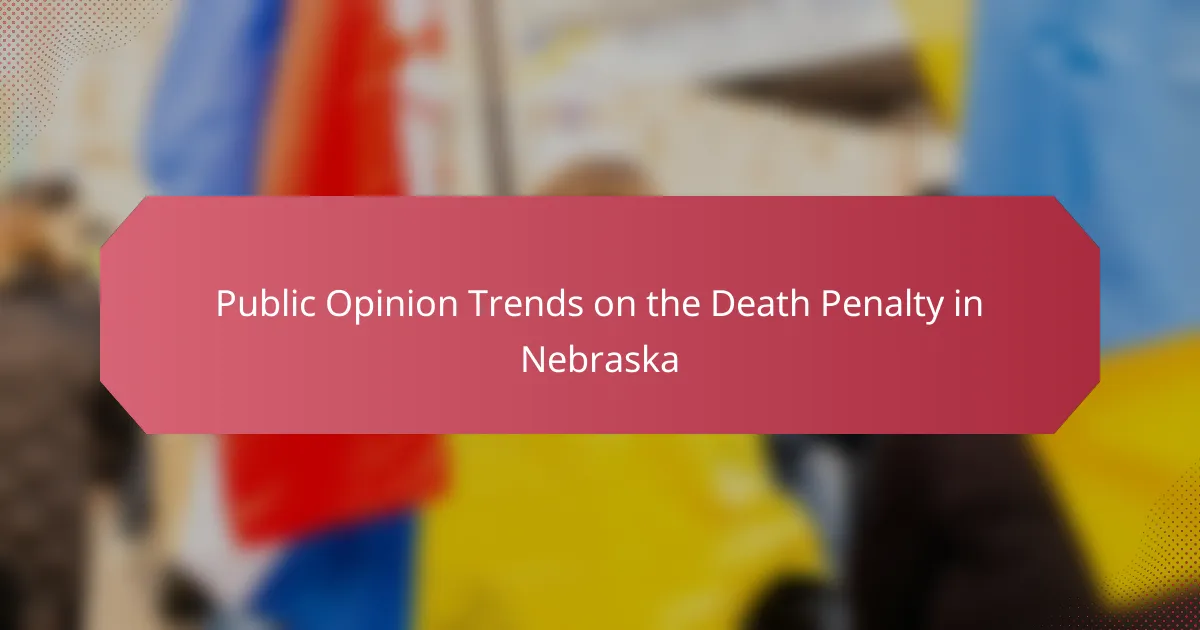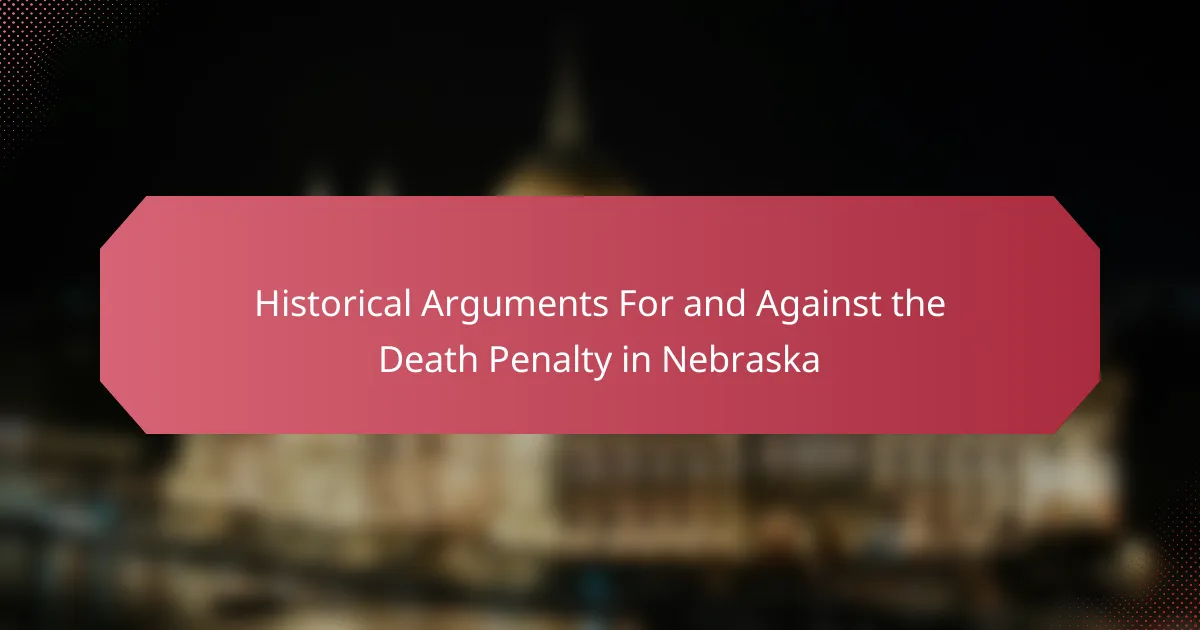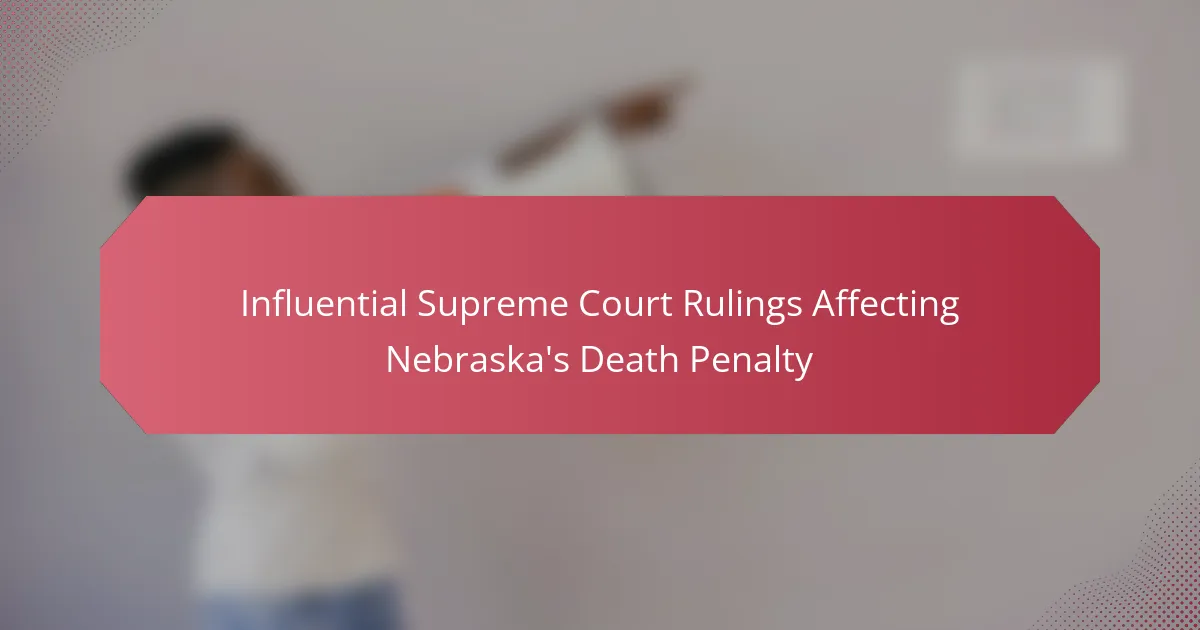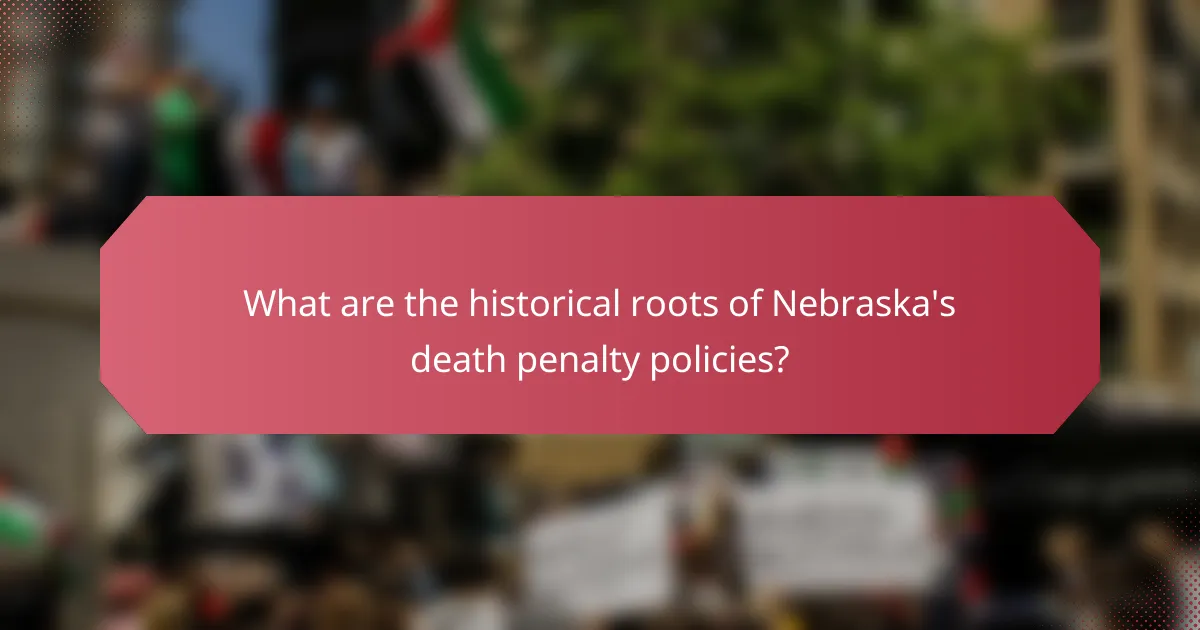
What are the historical roots of Nebraska’s death penalty policies?
Nebraska’s death penalty policies have historical roots dating back to the 19th century. The state enacted its first death penalty law in 1873, which allowed for execution by hanging. In 1913, the method of execution was changed to the electric chair. Nebraska’s death penalty faced various changes and challenges over the decades. In 1972, the U.S. Supreme Court ruled in Furman v. Georgia that the death penalty was unconstitutional in its application, leading to a temporary halt in executions nationwide. Nebraska abolished the death penalty in 2015 but reinstated it in 2016. The state’s policies continue to evolve in response to legal, political, and social factors.
How have societal views on the death penalty in Nebraska evolved over time?
Societal views on the death penalty in Nebraska have shifted significantly over the years. Initially, public support for capital punishment was strong, reflecting a national trend. In the late 20th century, this support began to wane. Factors such as wrongful convictions and changing moral perspectives influenced public opinion. By the 2010s, a notable portion of the population began advocating for abolition. In 2015, Nebraska’s legislature voted to repeal the death penalty, indicating a major shift in societal views. Although the repeal was later overturned, the debate continues, showcasing the evolving attitudes towards capital punishment in the state. Public opinion polls indicate a growing preference for life sentences over the death penalty among Nebraskans.
What major events influenced changes in public opinion regarding capital punishment?
Major events that influenced changes in public opinion regarding capital punishment include high-profile wrongful conviction cases. One significant case was that of Gary Graham in Texas, executed in 2000 despite doubts about his guilt. Public outcry followed, raising awareness about flaws in the justice system.
Another influential event was the abolition of the death penalty in Illinois by Governor George Ryan in 2000. He cited concerns over wrongful convictions as the primary reason for the moratorium. This decision prompted national discussions about the death penalty’s reliability.
The 2002 U.S. Supreme Court ruling in Atkins v. Virginia also shifted public opinion. The court ruled that executing individuals with intellectual disabilities is unconstitutional. This decision highlighted ethical considerations surrounding capital punishment.
Additionally, the rise of DNA evidence has exonerated many on death row. These exonerations have fueled debates about the death penalty’s moral implications. Public sentiment has increasingly leaned toward abolition or reform due to these events.
How have historical legal cases shaped Nebraska’s death penalty legislation?
Historical legal cases have significantly influenced Nebraska’s death penalty legislation. The 1972 U.S. Supreme Court case Furman v. Georgia declared the death penalty unconstitutional as applied, leading to a temporary halt in executions nationwide, including Nebraska. In response, Nebraska revised its death penalty statutes in 1979 to comply with constitutional standards.
Subsequent cases, such as Woodson v. North Carolina in 1976, emphasized the need for individualized sentencing, prompting further reforms in Nebraska’s sentencing procedures. The 2008 case of State v. Mata reaffirmed the state’s death penalty framework, addressing issues of due process and proportionality.
These cases have shaped the legal landscape by establishing precedents that Nebraska’s lawmakers must consider when crafting death penalty legislation. The ongoing legal scrutiny has led to periodic revisions and debates surrounding the morality and application of capital punishment in the state.
What are the key legislative milestones in Nebraska’s death penalty history?
The key legislative milestones in Nebraska’s death penalty history include the establishment of the death penalty in 1873. In 1913, the state shifted from hanging to electrocution as the primary method of execution. The Nebraska Legislature abolished the death penalty in 1979, replacing it with life imprisonment. However, in 1993, the death penalty was reinstated after a voter referendum. In 2008, the Nebraska Supreme Court ruled that the electric chair was unconstitutional. The state then adopted lethal injection as the method of execution. In 2015, the legislature voted to abolish the death penalty again, but the governor vetoed the bill. In 2016, the legislature attempted to override the veto but was unsuccessful. Most recently, in 2019, the state executed its first inmate since 2018, marking a significant moment in its death penalty history.
Which laws have been enacted or repealed in relation to capital punishment?
Nebraska has enacted and repealed several laws regarding capital punishment. In 1979, Nebraska reinstated the death penalty after a 1972 U.S. Supreme Court ruling declared it unconstitutional. In 2015, the Nebraska Legislature passed a bill to abolish the death penalty, which was signed into law by Governor Pete Ricketts. However, in 2016, the state voters approved a referendum to reinstate the death penalty, reversing the 2015 legislation. These changes reflect ongoing debates and shifts in public opinion regarding capital punishment in Nebraska.
How have gubernatorial decisions impacted the death penalty in Nebraska?
Gubernatorial decisions have significantly impacted the death penalty in Nebraska. In 2015, Governor Pete Ricketts signed a bill to reinstate the death penalty after it had been abolished by the legislature. This decision reversed the 2015 legislative vote that sought to eliminate capital punishment. Governor Ricketts emphasized the need for the death penalty as a tool for justice. His administration has since worked to ensure the implementation of executions. Additionally, the governor’s stance has influenced public opinion and legislative discussions surrounding capital punishment in the state. The impact of these decisions continues to shape Nebraska’s approach to the death penalty.
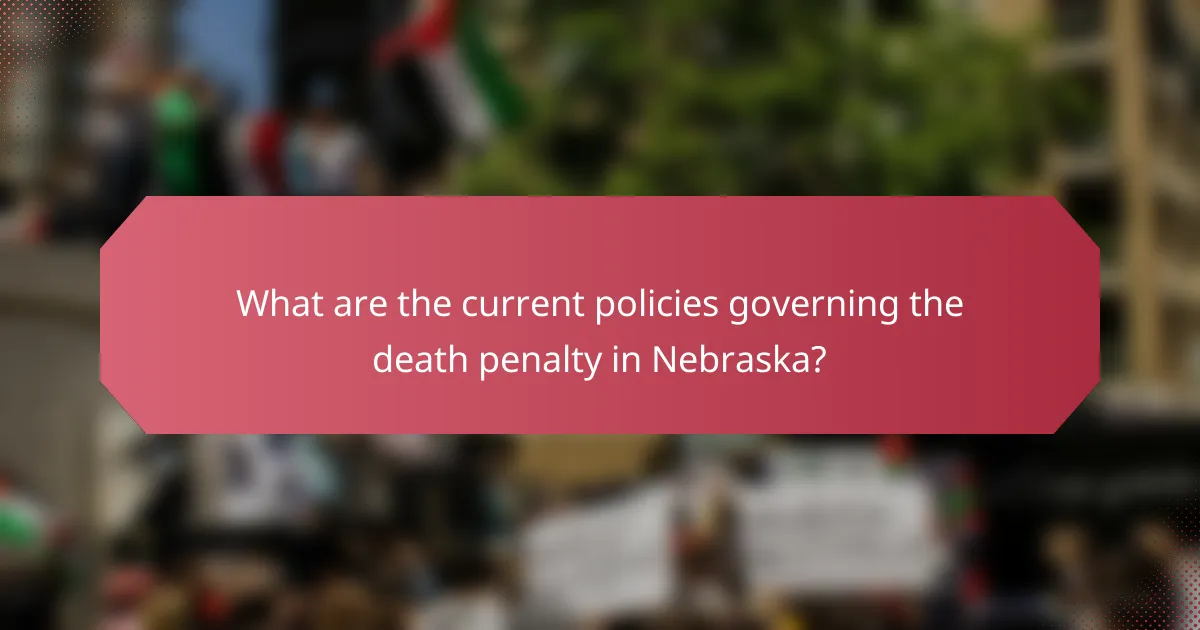
What are the current policies governing the death penalty in Nebraska?
Nebraska currently enforces the death penalty as a legal form of punishment. The state has a lethal injection protocol for executions. In 2015, Nebraska’s legislature passed a bill to abolish the death penalty, but the law was repealed in 2016 after a referendum. As of now, there are ten inmates on death row in Nebraska. The Nebraska Department of Correctional Services oversees the administration of the death penalty. The state requires a two-drug protocol for lethal injections. Additionally, the death penalty is applicable only for first-degree murder convictions. Legal challenges and public opinion continue to shape the policies surrounding capital punishment in Nebraska.
How does Nebraska’s death penalty process operate today?
Nebraska’s death penalty process operates under a lethal injection protocol. The state has a three-drug combination for executions. This method includes an anesthetic, a paralytic agent, and a drug to induce cardiac arrest. Nebraska’s Supreme Court oversees legal challenges related to the death penalty. In recent years, there have been debates about the legality and morality of capital punishment. As of now, Nebraska has not executed anyone since 2018. The state has faced difficulties in obtaining execution drugs due to pharmaceutical companies’ restrictions. Legislative changes have also influenced the death penalty process in Nebraska.
What are the steps involved in a death penalty case in Nebraska?
A death penalty case in Nebraska involves several key steps. The process begins with the arrest and charging of the defendant with a capital offense. Following this, a preliminary hearing is held to determine if there is enough evidence for the case to proceed. If sufficient evidence exists, the case moves to the arraignment stage, where the defendant enters a plea.
Next, the prosecution and defense engage in discovery, exchanging evidence and witness lists. This is followed by pre-trial motions, which may include challenges to the death penalty itself. Jury selection occurs next, where a panel is chosen to hear the case.
During the trial, the prosecution must prove the defendant’s guilt beyond a reasonable doubt. If found guilty, a separate sentencing phase follows. In this phase, both sides present evidence regarding the appropriateness of the death penalty. The jury then deliberates and decides on the sentence.
If the death penalty is imposed, the case enters the appeals process. This process can take years and involves multiple levels of review. Each step is subject to various legal standards and procedures as outlined in Nebraska law.
What role do juries play in capital punishment cases in Nebraska?
Juries in Nebraska play a critical role in capital punishment cases by determining guilt and recommending sentences. In these cases, juries assess evidence presented during the trial. They must reach a unanimous decision to convict a defendant of first-degree murder. If convicted, the jury then deliberates on whether to impose the death penalty. Nebraska law requires juries to consider aggravating and mitigating factors in their sentencing recommendation. This process ensures that the jury’s decision reflects the severity of the crime. Juries are essential in maintaining a balance between justice and the severity of capital punishment. Their recommendations are influential in the final sentencing by the judge.
What are the controversies surrounding Nebraska’s death penalty policies?
Nebraska’s death penalty policies are controversial due to ethical, legal, and procedural concerns. Critics argue that the death penalty is inhumane and poses a risk of executing innocent individuals. The state’s history of botched executions has raised questions about the methods used. Additionally, there is significant public debate over the morality of capital punishment. In 2015, Nebraska’s legislature voted to abolish the death penalty, but the decision was overturned by a ballot initiative in 2016. This back-and-forth reflects deep divisions within the state regarding the issue. Legal challenges continue to arise, focusing on the constitutionality of the death penalty and its application. These controversies highlight ongoing tensions between public opinion, moral considerations, and the legal framework governing capital punishment in Nebraska.
How do opponents and proponents of the death penalty argue their positions?
Opponents of the death penalty argue that it is inhumane and prone to errors. They highlight the potential for wrongful convictions. Statistics show that innocent people have been executed, raising ethical concerns. Additionally, they argue that the death penalty does not deter crime effectively. Studies indicate that states without the death penalty often have lower murder rates.
Proponents of the death penalty argue that it serves as a deterrent to serious crimes. They believe it provides justice for victims and their families. Supporters claim that it is a necessary tool for public safety. They often cite polls showing public support for capital punishment. Furthermore, they argue that it can be applied fairly when due process is followed.
What recent legal challenges have arisen against the death penalty in Nebraska?
Recent legal challenges against the death penalty in Nebraska include a lawsuit filed by the American Civil Liberties Union (ACLU). This lawsuit argues that the state’s execution method violates the Eighth Amendment’s prohibition against cruel and unusual punishment. The ACLU claims that the use of certain drugs in lethal injections poses significant risks of pain and suffering. Additionally, there have been challenges related to the state’s secrecy laws concerning the sources of execution drugs. These legal actions reflect ongoing debates about the morality and legality of capital punishment in Nebraska.
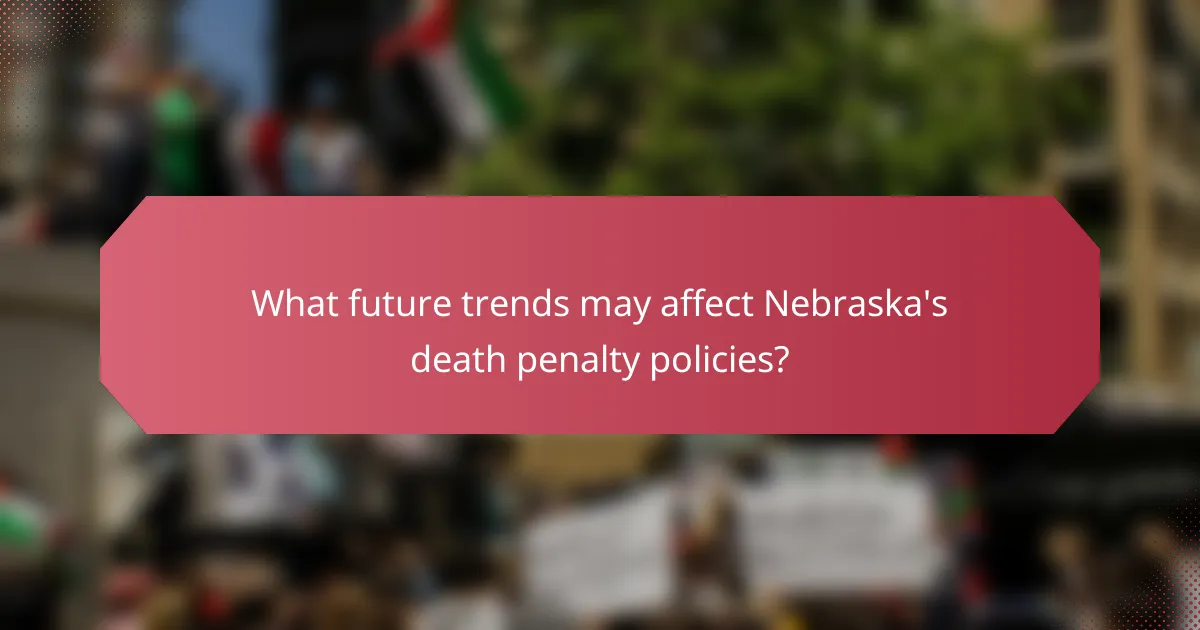
What future trends may affect Nebraska’s death penalty policies?
Future trends that may affect Nebraska’s death penalty policies include shifts in public opinion, legal challenges, and legislative changes. Public sentiment is increasingly leaning towards abolition, as evidenced by polls showing a decline in support for capital punishment. Legal challenges may arise from evolving interpretations of constitutional rights, particularly surrounding cruel and unusual punishment. Additionally, states across the U.S. are reconsidering their death penalty laws, which could influence Nebraska lawmakers. The financial burden of maintaining the death penalty is another concern, with studies indicating significant costs compared to life imprisonment. These factors collectively suggest a potential reevaluation of Nebraska’s death penalty framework in the coming years.
How might public opinion influence future legislative changes?
Public opinion can significantly influence future legislative changes regarding the death penalty in Nebraska. Lawmakers often consider public sentiment when drafting or amending laws. For example, if a majority of Nebraskans oppose the death penalty, legislators may be pressured to repeal it. Historical instances show that shifts in public opinion have led to legislative reforms in various states. In 2015, Nebraska’s legislature voted to abolish the death penalty, reflecting changing public attitudes. Polls indicating declining support for capital punishment can motivate lawmakers to pursue alternatives. Conversely, strong support for the death penalty may lead to its reinforcement. Thus, public opinion serves as a critical barometer for legislative action on this issue.
What role does advocacy play in shaping the future of capital punishment in Nebraska?
Advocacy plays a crucial role in shaping the future of capital punishment in Nebraska. Advocacy groups actively campaign for legislative changes regarding the death penalty. They raise public awareness about the moral and ethical implications of capital punishment. These groups often conduct research and provide data supporting their positions. For instance, a report by the Nebraska Coalition to End the Death Penalty highlights the financial costs associated with capital punishment. Public opinion can shift due to advocacy efforts, influencing lawmakers’ decisions. In recent years, advocacy has contributed to significant policy changes, including the repeal of the death penalty in 2015. The ongoing dialogue fostered by advocacy continues to impact future legislative actions.
How could national trends in death penalty policies impact Nebraska?
National trends in death penalty policies could significantly impact Nebraska’s legislative decisions and public opinion. As more states move toward abolition or moratoriums, Nebraska may feel pressure to reconsider its own stance. For instance, states like California and Virginia have enacted reforms that reflect a growing national sentiment against the death penalty. This trend could lead to increased advocacy efforts within Nebraska, pushing for policy changes. Additionally, if national public opinion shifts further against capital punishment, Nebraska legislators may face challenges in justifying its continued use. Historical data shows that states aligning with national trends tend to see a decline in death penalty applications. Therefore, Nebraska’s policies could evolve in response to these broader societal changes.
What practical considerations should Nebraskans be aware of regarding the death penalty?
Nebraskans should be aware of the legal and procedural aspects of the death penalty. The state has a history of legislative changes regarding capital punishment. In 2015, Nebraska passed a law to abolish the death penalty, but it was reinstated in 2016 through a voter referendum. The current law allows for the death penalty under specific circumstances. It is crucial for residents to understand the appeals process involved in death penalty cases. Legal representation is essential for defendants facing capital charges. Additionally, public opinion may influence future legislative actions concerning the death penalty. Costs associated with death penalty cases are typically higher than non-capital cases. These factors contribute to the ongoing debate about the death penalty in Nebraska.
The main entity of this article is Nebraska’s death penalty policies. The article examines the historical roots of these policies, tracing their evolution from the first death penalty law enacted in 1873 to the current legal framework governing capital punishment. It discusses societal attitudes towards the death penalty, key legislative milestones, and the impact of historical legal cases on Nebraska’s legislation. Additionally, the article highlights recent controversies, public opinion trends, and the role of advocacy in shaping future policies related to the death penalty in Nebraska.
